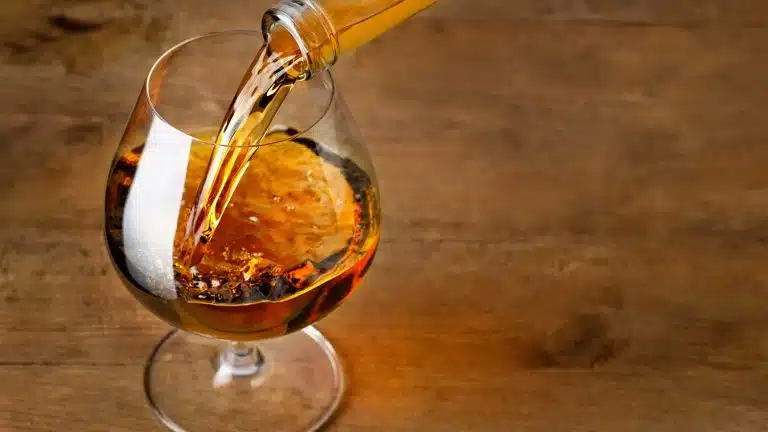Brandy Alcohol Content | How Much Alcohol Is In Brandy?

Brandy has an average alcohol content between 35-60%, depending on the distillery it comes from and the ingredients used. U.S. law states brandy has to have a minimum alcohol by volume (ABV) of 40%.
Brandy is an alcoholic beverage that comes from the distillation of wine.
Grapes are commonly used to make wine and brandy, but brandy can also come from apples, apricots, strawberries, plums, and other fruits. Brandy can also be added to other wines to make fortified wine and raise their alcohol content.
Brandy is an alcoholic drink known for its higher alcohol content, and some brands may be as strong as vodka, tequila, or whiskey. While it may be enjoyed in moderation, drinking too much brandy can be bad for your health.
Alcohol Percentage By Brandy Type
The alcohol content of brandy depends on the production methods, ingredients, and even the region the distillery comes from. Wine has a lower alcohol content compared to most distilled spirits, but by distilling it again brandy becomes a much stronger drink.
The alcohol content of well-known brandy products include:
- Courvoisier Cognac VSOP: 40% ABV
- Rémy Martin XO Cognac: 40% ABV
- Copper & Kings American Craft Brandy: 45% ABV
- Pisco Portón: 43% ABV
- Dupont Calvados VSOP: 42% ABV
- Martell Cordon Bleu Cognac: 40% ABV
Differences Between Types Of Brandy
Unlike other spirits, brandy may be made in different locations with different ingredients. These differences can affect the taste, feel, appearance, and even alcohol content of the final product.
Brandy likely has a high alcohol content after going through distillation, and distillers may dilute their brandy with water to meet regulations.
Location
Each place that makes brandy has its own unique ways of making it. This applies for distilleries and different countries that make brandy. The quality and type of ingredients that each location has access to may also vary.
Cognac, a famous type of brandy, can only be produced in the Cognac region of France. Armagnac is another French brandy made only in the Armagnac region. French, Dutch, Spanish, and American brandies are all separate types of brandy.
Ingredients
Brandy has different ingredients depending on where it is made, which can affect the flavor of the final product.
Marc or grappa brandy is made from pomace, which is a leftover residue from grape winemaking. Apple brandy, apricot brandy, and plum brandy are also types of brandy enjoyed all over the world.
Grape varieties play a large part in wine types and brandy types. Just as red wine is different from white wine, brandy distilled from grape skins is different from brandy distilled from the grape residue (or pomace).
Distillation Process
Distillation processes can vary depending on the ingredients used, the amount of ethanol distracted, and the times that brandy is distilled.
The type of wine used to make brandy is different from the wine sold in stores. Brandy is distilled from base wine, which has only gone through the first stage of fermentation. The base wine is distilled in a chamber known as a pot still, which increases the alcohol content.
Brandy is distilled at least twice before aging.
Aging
After distilling, brandy is placed in oak barrels or casks to age. Aging spirits adds cogeners, color, and flavor. Aged spirits are seen as higher-quality and more expensive than non-aged spirits.
Cognac and armagnac have specific categories depending on how long they are aged. Very special, or VS, is cognac that has aged for at least 2 years. Very superior old pale, or VSOP, is cognac that has aged for at least 4 years, while XO cognac has aged for at least 6 years.
Not all distillers age their brandy. Grappa is an unaged form of brandy made in Italy and California.
Drinking Too Much Brandy
Brandy is a famous alcoholic drink that has been around for centuries. It may be enjoyed during a night out or as an after-dinner drink, but drinking too much brandy can be bad for your health.
Drinking too much brandy is linked to a higher risk of drunk driving, alcohol addiction, heart disease, and other serious problems. If you feel like drinking brandy is taking over your life, you may have a drinking problem.
To find professional help for a drinking problem, please contact our helpline today.
Written by Ark Behavioral Health Editorial Team
©2024 Ark National Holdings, LLC. | All Rights Reserved.
This page does not provide medical advice.
Electronic Code of Federal Regulations - Electronic Code of Federal Regulations (eCFR)
Encyclopedia Britannica - brandy | Description, History & Facts
Google Books - The Oxford Handbook of Food Fermentations
Questions About Treatment?
Ark Behavioral Health offers 100% confidential substance abuse assessment and treatment placement tailored to your individual needs. Achieve long-term recovery.
100% confidential. We respect your privacy.
Prefer Texting?
Our friendly support team is here to chat 24/7. Opt out any time.







 Learn More
Learn More








